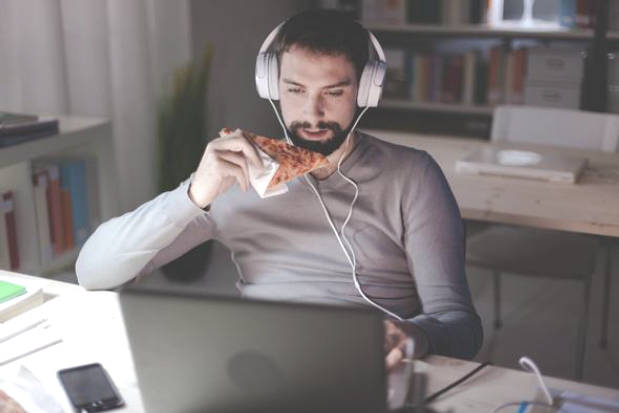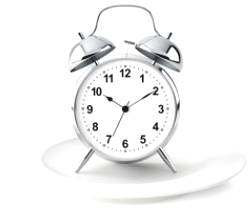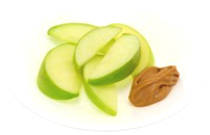
Many people believe that eating before bed is not good at all. This comes from the thought that eating before bed will lead to weight gain.
However, some argue that eating a small amount of snacks before going to bed can help with weight loss.
So which side should we trust?
In fact, the answer will vary depending on the individual.
Eating before bed is controversial
Should eat before going to bed (it is understood that the period between dinner and bedtime) has become a hot topic of nutrition.
Usually many people think that eating before going to bed will cause weight gain because the metabolism slows down when the body is sleeping. This makes the undigested calories stored as fat.
However, many medical experts believe that eating before going to bed is absolutely good, can even improve sleep and weight loss .
So it is not surprising that this confuses many people.
Part of the problem is that the evidence seems to support both sides.
Although many people think that metabolism slows down while the body is sleeping, it can lead to weight gain, but the rate of metabolism between day and night is equal. Our bodies still need a lot of energy while sleeping .
There is no evidence to support the view that the body stores more calories before going to bed than at other times of the day.
But despite the fact that there seems to be no physiological reason to explain, some studies still link eating before going to sleep and gaining weight again .
So what's going on here? The reason may not be what you expected.
Conclude: Eating before sleeping is a controversial issue. Although there seems to be no reason why eating before bed will lead to weight gain, some studies have found evidence that it may.
Eating before bed can lead to unhealthy habits

Current evidence suggests that there is no physiological reason for eating before bed will lead to weight gain. However, some studies have found that people who often eat before sleeping are more likely to gain weight .
The reason for this is very simple.
Research shows that people who eat before sleeping are more likely to gain weight simply because a snack is counted as an extra meal, so it will increase the calories for the body.
Not only that, the evening is the time when many people tend to feel hungry. This makes calories of the night meal is likely to exceed the daily necessity for the body .
Add the fact that most people like to enjoy a night meal while watching TV or working on a computer, so it's not surprising that these habits are the cause of weight gain.
Some people also feel very hungry before going to bed because they don't eat enough during the day.
This feeling of hunger causes a recurring cycle, when eating too much before going to bed will make us feel bloated the next morning and continue to feel hungry at night .
This cycle can easily lead to overeating, which causes the body to be overweight, which highlights the importance of eating well during the day.
For most people, the problem of eating before bed is not metabolism to store calories into fat at night, causing weight gain. Instead, weight gain is due to unhealthy habits that often accompany eating.
Conclude: In most cases, eating before going to bed causes weight gain because of eating habits such as watching TV or eating too much food that contains calories before sleeping.
Do not eat before bed if you have gastroesophageal reflux

Symptoms of this disease include heartburn, indigestion, lumps in the throat or asthma at night if aggravated .
If you have any of the above symptoms, it's best to avoid snacking before going to bed.
Eating before bed can make these symptoms aggravated by acid easily refluxing to the throat when lying down .
Therefore, if you have gastroesophageal reflux, it's best to avoid using anything for at least 3 hours before going to bed .
Also, avoid caffeinated foods such as alcohol, tea, chocolate or spicy foods. These foods can exacerbate the above symptoms.
Conclude: People with gastroesophageal reflux should avoid eating for at least 3 hours before going to bed. They should also remove foods that aggravate these symptoms.
Eating before bed still has some benefits
For some people, eating before bed is a good idea.
It helps to suppress eating in the middle of the night and therefore helps to lose weight.
Some evidence suggests that instead of gaining weight, eating a light meal before going to bed helps some people lose weight.
If you are the type of person who eats a lot of high-calorie foods at night (usually after sleep), a snack after dinner will help to suppress midnight hunger .
In a 4-week study with snacking at night, the group of people who used a bowl of cereal and milk 90 minutes after dinner tended to eat an average of 397 calories a day .
As a result, they lost an average of 1.85 pounds (0.84kg) from this change .
This study suggests that taking a snack after dinner can help nocturnal people tend to eat less than they want. Over time, it will also have benefits for weight loss.
Help you sleep better

This means that eating a light meal before bed can help your body feel full and comfortable throughout the night .
Getting enough sleep is very important, because lack of sleep itself is also linked to overeating and weight gain .
There is no evidence that a healthy, light meal before going to bed will lead to weight gain.
Therefore, if you feel that eating something before you sleep makes your sleep more deep and delicious, don't worry about doing it right away.
Stabilize blood sugar in the morning
In the morning, your liver starts producing extra glucose (blood sugar) to provide the energy needed for a long day.
This process rarely causes changes in blood sugar levels for people without diabetes. However, people with diabetes cannot produce enough insulin to remove excess glucose in the blood.
For this reason, diabetics often wake up in the morning with high blood sugar, even if they don't eat anything the night before. This situation is called Dawn Phenomenon (Dawn Phenomenon) .
People with hypoglycemia or low blood sugar at night, can cause sleep disorders .
If you experience either of these symptoms, you may need to see a doctor to discuss medication adjustments.
In addition, some studies show that bedtime snacks can help prevent blood sugar changes by providing an additional source of energy at night .
However, the research results are quite mixed, so this cannot be applied to all subjects.
If you have high or low blood sugar in the morning, talk to your doctor or dietitian about whether it is appropriate to have a light meal before going to bed.
Conclude: A bedtime snack has a number of benefits such as making you eat less at midnight or sleeping better. It also helps maintain blood sugar stability.
What to eat before going to bed?

There is no perfect snack recipe before going to bed, but there are some things to keep in mind.
Avoid desserts and junk food
While it is not really a good idea to eat a snack before bed, it does not really make you gain weight, but it is not a good idea to eat desserts or snacks like ice cream, chips or chips.
These foods contain many unhealthy fats and sugar additives, stimulating appetite and overeating. These foods are easy to make calories exceed daily needs.
Eating a snack before bed doesn't really make you gain weight, but eating the above foods is another thing. Try to avoid these foods as much as possible.
If you like sweet food, you can try fruits or some dark chocolate bars (if not affected by caffeine), or use some nuts in case of salty foods.
Combine carb with protein or fat
No food is the "best" for light snacks before going to bed. However, combining carb with protein or a little fat is definitely a good dish .
Complex carb types in whole grains, fruits and vegetables provide a stable source of energy when sleeping.
Combined with protein and a little fat helps your body feel full at night and keep it blood sugar always stable.
However, this combination also has other benefits.
Some evidence suggests that eating high-carb foods with a high blood sugar index before bed makes it easier to sleep .
This is because carb helps to improve the transport of amino acids tryptophan, converted into neurotransmitters that help regulate sleep .
The same effect applies to tryptophan-rich foods, such as milk, fish, poultry or red meat .
Some evidence also indicates that taking a high-fat meal can improve sleep quality .
Some ideas for snacks include an apple with peanut butter, crackers and a slice of turkey, or cheese and grapes.
Conclude: Taking a snack before bed is usually quite good for most people, but avoid snacks and desserts. In addition, the combination of carb and protein or fat in the dish is very welcome.
Should I eat before sleeping?
The answer is depending on your habits, it may be good or bad.
It is not really good to keep up the habit of using unhealthy foods before sleeping, or consuming large amounts of calories at night.
However, it is perfectly okay for most people to take a healthy snack before going to bed.
